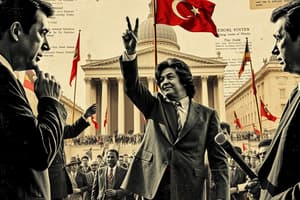Podcast
Questions and Answers
What are the two main forms of democracy?
What are the two main forms of democracy?
- Socialism and communism
- Constitutional monarchy and oligarchy
- Direct democracy and representative democracy (correct)
- Theocracy and dictatorship
In ancient Athens, women could vote in political elections.
In ancient Athens, women could vote in political elections.
False (B)
What is the difference between the legislative branch and the judicial branch of government?
What is the difference between the legislative branch and the judicial branch of government?
The legislative branch makes laws, while the judicial branch enforces those laws.
In a(n) ______, a small group of people control the country.
In a(n) ______, a small group of people control the country.
Match the following terms with their definitions:
Match the following terms with their definitions:
Which of the following is a characteristic of a theocracy?
Which of the following is a characteristic of a theocracy?
In a theocracy, laws are derived from both secular and religious sources.
In a theocracy, laws are derived from both secular and religious sources.
What is the primary source of law in a theocracy?
What is the primary source of law in a theocracy?
In a theocracy, the ______ branch of government is influenced and guided by the state religion's laws.
In a theocracy, the ______ branch of government is influenced and guided by the state religion's laws.
Match the following terms related to theocracies with their descriptions:
Match the following terms related to theocracies with their descriptions:
Flashcards
Oligarchs
Oligarchs
Influential individuals who control businesses and media.
Censorship
Censorship
Suppression of information by controlling media.
Theocracy
Theocracy
A government shaped by religious laws and leaders.
Sacred law
Sacred law
Signup and view all the flashcards
Judicial branch in a theocracy
Judicial branch in a theocracy
Signup and view all the flashcards
Democracy
Democracy
Signup and view all the flashcards
Direct Democracy
Direct Democracy
Signup and view all the flashcards
Representative Democracy
Representative Democracy
Signup and view all the flashcards
Rights in Democracy
Rights in Democracy
Signup and view all the flashcards
Judicial Branch
Judicial Branch
Signup and view all the flashcards
Elections in Oligarchy
Elections in Oligarchy
Signup and view all the flashcards
Influence in Oligarchy
Influence in Oligarchy
Signup and view all the flashcards
Study Notes
Democracy
- Definition: Derived from Greek words "demos" (people) and "kratos" (rule), meaning "rule by the people."
- Direct Democracy (Ancient Athens): Citizens voted directly on issues.
- Modern Representative Democracy: Citizens elect representatives to govern. Eligibility criteria often include age (e.g., 18+).
- Rights: Free and fair elections, freedom of assembly, freedom to live as desired. Freedom of the press and media are also fundamental rights.
- Governance: Division of power into branches (legislative, judicial). Legislative makes laws, judicial enforces, and elections are routinely held. Timelines for elections are often predictable (e.g., 4-5 years).
- Rule of Law: Laws are applied fairly to everyone.
Oligarchy
- Definition: A small group controls the country.
- Control Mechanisms: Control is achieved through wealth, connections to powerful officials, or force, possibly behind closed doors.
- Elections: They may hold elections but the ruling group remains in power regardless of outcomes.
- Influence on Institutions: Judicial branch decisions are influenced by the oligarchy.
- Media Control: Oligarchs often control media, enabling manipulation of public perception, including censorship.
- Economic Power: Often correlated with control of businesses.
Theocracy
- Definition: Government based on a state religion.
- Lawmaking: Laws derived from religious texts (e.g., holy books) and religious traditions. Civil law equals religious law.
- Leadership: Leaders can be elected, appointed, or chosen by religious custom.
- Judiciary: Judicial interpretations (rulings) align with the state religion's laws and punishments.
- Control over Institutions: State may control businesses and media outlets.
- Impact on Citizens: Practices and beliefs are driven by the religious values of the state.
Studying That Suits You
Use AI to generate personalized quizzes and flashcards to suit your learning preferences.




